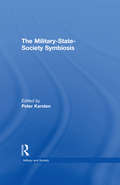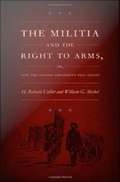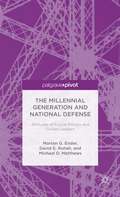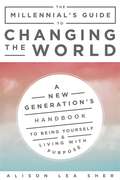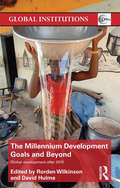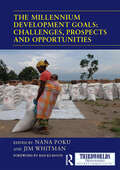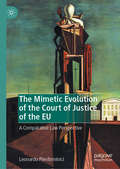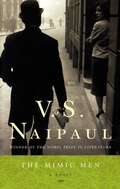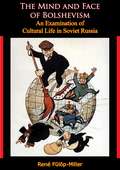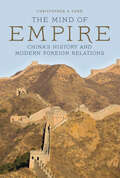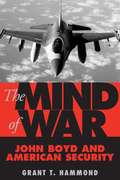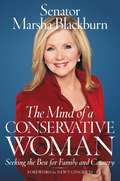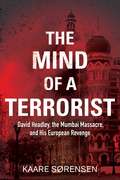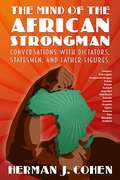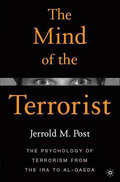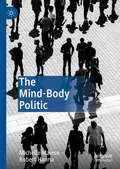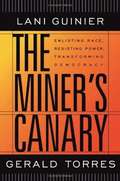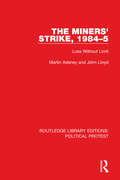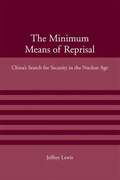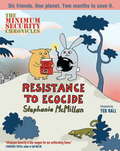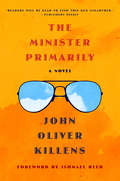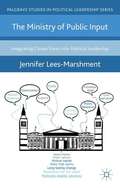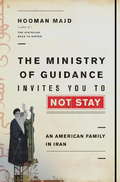- Table View
- List View
The Military-State-Society Symbiosis (Military and Society #5)
by Peter KarstenFirst Published in 1999. Routledge is an imprint of Taylor & Francis, an informa company.
The Militia and the Right to Arms, or, How the Second Amendment Fell Silent
by H. Richard Uviller William G. Merkel"A well regulated Militia, being necessary to the security of a free State, the right of the people to keep and bear Arms, shall not be infringed. " --Amendment II, United States Constitution The Second Amendment is regularly invoked by opponents of gun control, but H. Richard Uviller and William G. Merkel argue the amendment has nothing to contribute to debates over private access to firearms. In The Militia and the Right to Arms, or, How the Second Amendment Fell Silent, Uviller and Merkel show how postratification history has sapped the Second Amendment of its meaning. Starting with a detailed examination of the political principles of the founders, the authors build the case that the amendment's second clause (declaring the right to bear arms) depends entirely on the premise set out in the amendment's first clause (stating that a well-regulated militia is necessary to the security of a free state). The authors demonstrate that the militia envisioned by the framers of the Bill of Rights in 1789 has long since disappeared from the American scene, leaving no lineal descendants. The constitutional right to bear arms, Uviller and Merkel conclude, has evaporated along with the universal militia of the eighteenth century. Using records from the founding era, Uviller and Merkel explain that the Second Amendment was motivated by a deep fear of standing armies. To guard against the debilitating effects of militarism, and against the ultimate danger of a would-be Caesar at the head of a great professional army, the founders sought to guarantee the existence of well-trained, self-armed, locally commanded citizen militia, in which service was compulsory. By its very existence, this militia would obviate the need for a large and dangerous regular army. But as Uviller and Merkel describe the gradual rise of the United States Army and the National Guard over the last two hundred years, they highlight the nation's abandonment of the militia ideal so dear to the framers. The authors discuss issues of constitutional interpretation in light of radically changed social circumstances and contrast their position with the arguments of a diverse group of constitutional scholars including Sanford Levinson, Carl Bogus, William Van Alstyne, and Akhil Reed Amar. Espousing a centrist position in the polarized arena of Second Amendment interpretation, this book will appeal to those wanting to know more about the amendment's relevance to the issue of gun control, as well as to those interested in the constitutional and political context of America's military history.
The Millennial Generation and National Defense: Attitudes of Future Military and Civilian Leaders
by Michael D. Matthews Morten G. Ender David E. RohallThis study captures the attitudes and values of the youth generation of college students in the USA toward the military, war, national defence, and foreign policy matters. Providing a unique insight into civilian and military Millenials, the authors explore the impact of 9/11 and the level of tolerance within the military.
The Millennial Generation: Implications for the Intelligence and Policy Communities
by Cortney Weinbaum Jenny Oberholtzer Richard S. GirvenIn 2015, for the first time, millennials outnumbered baby boomers as the largest generational segment of the U.S. population. This report describes how the intelligence community must engage millennials across multiple segments to succeed in the future: millennials as intelligence clients, employees, and partners and as members of the public.
The Millennial's Guide to Changing the World: A New Generation's Handbook to Being Yourself and Living with Purpose
by Alison Lea SherA guide and blueprint to a purposeful millennial existence—and how we can make a difference. What does it mean to be a millennial in this chaotic world? Beyond Snapchat and Tinder, the consumerist culture we’ve inherited, and quarter-life crises, can a millennial aspire to more? Alison Lea Sher argues, yes, we can! Packing herself up in an RV, Sher embarks on a road trip in hopes of starting a conversation about what it means to grow up in America, post-Great Recession. Interviewing 150 of her millennial peers as they begin their adult lives—from kids heading straight to Wall Street after college to those sleeping on it—Sher asks: “Who are you; what should you do; and how can you step into your destiny as a stakeholder in society?” The Millennial’s Guide to Changing the World is a one-of-a-kind ethnographic study on the spotlighted millennial generation, as told by millennials—the largest generation in US history that is now transitioning from adolescence to adulthood. As millennials embark on a young adult quest during a frightening time, how can they enlist the idealism, values, and resistance politics they are so well-known for to discover a sense of self and purpose? Learn how to: “Adult”—and not in the way society defines itRide the technology revolution, instead of letting it ride youBe ethical, inclusive, and sex-positive in your relationshipsResist the corporate oligarchy we live inRecognize privilege, embrace diversity, and fight for equalitySave the earth, literally With intimate stories, ethnographic research, and practical tips, The Millennial’s Guide to Changing the World will inspire every young person, showing them how to optimize their coming-of-age potential in a world that desperately needs it.
The Millennium Development Goals and Beyond: Global Development after 2015 (Global Institutions)
by Rorden Wilkinson David HulmeThe Millennium Development Goals (MDGs) have contributed to reductions in poverty and improvements in the human condition in many parts of the world since their "invention" in 2000 and 2001. It nonetheless remains the case that today, as on all the previous days of the twenty-first century, almost one billion people will go hungry. Debates about whether the MDGs have made a positive contribution to poverty eradication and/or whether they have achieved as much as they should have done are becoming more frequent as 2015 and the "end of the MDGs" approaches. This book highlights that active debate about what the MDGs have achieved and what that means for the crafting of a post-2015 international framework for action, must become a priority. The work begins by examining the global context of the goals from a variety of perspectives, and moves on to focus on the region that continues to be the most impoverished and which looks likely to fall short of meeting many of the MDGs: Africa. Presenting both a broad overview of the issues and drawing together prestigious scholars and practitioners from a variety of fields, this work provides a significant contribution to debates surrounding both global poverty and the success and future of the MDGs.
The Millennium Development Goals and Human Rights
by Malcolm Langford Malcolm Langford Andy Sumner Alicia Ely Yamin Andy SumnerThe Millennium Development Goals (MDGs) have generated tremendous discussion in global policy and academic circles. On the one hand, they have been hailed as the most important initiative ever in international development. On the other hand, they have been described as a great betrayal of human rights and universal values that has contributed to a depoliticization of development. With contributions from scholars from the fields of economics, law, politics, medicine, and architecture, this volume sets out to disentangle this debate in both theory and practice. It critically examines the trajectory of the MDGs, the role of human rights in theory and practice, and what criteria might guide the framing of the post-2015 development agenda. The book is essential reading for anyone interested in global agreements on poverty and development.
The Millennium Development Goals: Challenges, Prospects and Opportunities (ISSN)
by Nana Poku and Jim WhitmanAs the 15-year Millennium Development Goals approach their conclusion, we can now measure their larger successes and failures in more than ‘snapshot fashion; and we can begin to consider how best to shape the international development agenda for the coming decades based on what we have learned. But the performance and outlook for the MDGs can neither be reduced to the sum of its eight goals, nor be divorced from international dynamics - the hard interests of states and other actors, and the global dynamics that impact on both. For that reason, this volume balances contextual analysis, the role of formative and constraining forces, the importance of normative considerations and illuminating case studies to deliver a study of the MDGs which has depth and nuance as well as breadth. Poised between judging the recent performance and the future promise of the MDGs, this book is substantial, provocative and timely.This book was published as a special issue of Third World Quarterly.
The Mimetic Evolution of the Court of Justice of the EU: A Comparative Law Perspective
by Leonardo PierdominiciThis book provides fresh perspectives in the legal study of the Court of Justice of the European Union. In the context of European studies, the Court has mainly been analysed in light of its central role in the process of continental integration. Moreover, the Court has traditionally been studied by specialists for its important role as an agent of comparative law. This book studies the evolution of the Court itself, rather than that of the EU legal order in its judge-made dimension, and addresses several institutional aspects of its structure and organization, selected and constructed as a complete range of symptomatic figures of judicial institutionalisation. In doing so, the author seeks to showcase how the development and the institutional evolution of the CJEU happened through a selective internalization of comparative influences.
The Mimic Men: A Novel (Vintage International)
by V. S. NaipaulFrom the Nobel Prize-winning author of The Enigma of Arrival comes a profound novel of cultural displacement, masterfully evoking a colonial man&’s experience in a postcolonial world.&“No one else … seems able to employ prose fiction so deeply as the very voice of exile.&” —The New York Review of BooksBorn of Indian heritage and raised on a British-dependent Caribbean island, Ralph Singh has retired to suburban London, writing his memoirs as a means to impose order on a chaotic existence. His memories lead him to recognize the paradox of his childhood during which he secretly fantasized about a heroic India, yet changed his name from Ranjit Kripalsingh. As he assesses his short-lived marriage to an ostentatious white woman, Singh realizes what has kept him from becoming a proper Englishman. But it is the return home and his subsequent immersion in the roiling political atmosphere of a newly self-governed nation that ultimately provide Singh with the necessary insight to discover the crux of his disillusionment.
The Mind and Face of Bolshevism: An Examination of Cultural Life in Soviet Russia
by René Fülöp-Miller F. S. FlintFirst published in 1927, this is the English translation of German author René Fülöp-Miller’s account of non-political developments under the Bolshevist regime. It thoroughly examines cultural life in the Soviet Union and illustrates, through rich use of photographs throughout, how the mechanistic theory—freed from the control of individualism and individualistic religion, or what the author calls ‘a collective man’—applies itself to decorative design, literature, monumental art, the theatre, music, and education.A revealing book which everyone should read.“The best and most profound book on Bolshevism which has hitherto appeared outside Russia. Fülöp-Miller’s examination is very objective and many-sided.” -NICOLAS BERDYAEV“The most comprehensive book on the non-political side of Bolshevism which, to our knowledge, has so far been published. It is a serious study of the social, philosophical, artistic, religious, and economic antecedents and consequences of Bolshevism, deriving its value not only from an obviously wide acquaintance with the literature of the Subject, but also from the fact that the writer has fortified his reading by firsthand study of and residence in Soviet Russia.”—The Times [London] Literary Supplement“This book is a profound psychological and social study of a movement which must be examined historically and scientifically rather than tested by the political tenets and beliefs to which other countries have for centuries been habituated. No one interested in modern Russia can afford to leave this book unread.”—Asiatic Review (London)“...it treats Bolshevism, not from the standpoint of politics or economics, but in its wider aspect, as a new way of life or a new religion. There is the most praiseworthy attempt at objectivity, and the information in the book is exceedingly interesting.” -BERTRAND RUSSELL
The Mind of Empire: China's History and Modern Foreign Relations (Asia In The New Millennium Ser.)
by Christopher A. Ford“Ford’s reading of Confucius is both shrewd and instructive, with implications for contemporary policymakers . . . a scholarly analysis of Chinese history.” —The Weekly StandardChina’s prosperity has increased dramatically in the last two decades, propelling the nation to a prominent position in the international community. Yet China’s ancient history still informs and shapes its understanding of itself in relation to the world. As a highly developed and modern nation, China is something of a paradox.In The Mind of Empire: China’s History and Modern Foreign Relations, Christopher A. Ford demonstrates how China’s historical awareness shapes its objectives and how the resulting national consciousness continues to influence the country’s policymaking. Despite its increasing prominence among modern, developed nations, China continues to seek guidance from a past characterized by Confucian notions of hierarchical political order and a “moral geography” that places China at the center of the civilized world.The Mind of Empire describes how these attitudes have clashed with traditional Western ideals of sovereignty and international law. Ford speculates about how China’s legacy may continue to shape its foreign relations and offers a warning about the potential global consequences. He examines major themes in China’s conception of domestic and global political order, describes key historical precedents, and outlines the remarkable continuity of China’s Sinocentric stance. Expertly synthesizing historical, philosophical, religious, and cultural analysis into a cohesive study of the Chinese worldview, Ford offers revealing insights into modern China.“A much-needed and an erudite contextualization . . . [this book] will benefit immensely those interested in the history and strategic culture of China’s foreign policy.” —The China Quarterly
The Mind of War: John Boyd and American Security
by Grant HammondThe ideas of US Air Force Colonel John Boyd have transformed American military policy and practice. A first-rate fighter pilot and a self-taught scholar, he wrote the first manual on jet aerial combat; spearheaded the design of both of the Air Force's premier fighters, the F-15 and the F-16; and shaped the tactics that saved lives during the Vietnam War and the strategies that won the Gulf War. Many of America's best-known military and political leaders consulted Boyd on matters of technology, strategy, and theory.In The Mind of War, Grant T. Hammond offers the first complete portrait of John Boyd, his groundbreaking ideas, and his enduring legacy. Based on extensive interviews with Boyd and those who knew him as well as on a close analysis of Boyd's briefings, this intellectual biography brings the work of an extraordinary thinker to a broader public.From the Trade Paperback edition.
The Mind of a Conservative Woman: Seeking the Best for Family and Country
by Senator Marsha BlackburnReject our society's liberal bias against conservative women and learn how traditional principles will secure a better future for us all with this inspiring guide from a political powerhouse.The Mind of a Conservative Woman challenges women to improve their place in life and open doors for themselves and the next generation through the courage of their convictions. Senator Blackburn expounds upon why beliefs labeled as "traditional" have common ground and can improve all of society, such as:Protecting the next generation, the family, and the freedom of faith and values,Supporting a free market that rewards women who apply their talents and rise to great heights,Respecting the institutions in our nation to make change from the inside,Securing an effective government that will not overreach, and Honoring and respecting those who hold differing opinions.Though it is politically liberal women who receive the attention of left-leaning media and universities, it is conservatism that guarantees what most women hold dear. Blackburn addresses the frustrations of working women and the false perceptions of women presented by the media in general.Her maxim "Leave Things in Better Shape Than You Found Them" will challenge you to improve your place in life and create opportunities you never dreamed possible for yourself and those around you.
The Mind of a Terrorist: David Headley, the Mumbai Massacre, and His European Revenge
by Kaare SørensenWith the Pacing of a Thriller, a Veteran Journalist’s Account of the Terrorist behind the Mumbai Attacks and a Planned Attack in EuropeDavid Headley, the American-Pakistani also known as Daood Gilani, lived a double life. One day he would stroll through Central Park in his tailored Armani suit as a true New Yorker, and the next he would browse in the bazaar in Lahore wearing traditional Pakistani clothes. One day he would drink champagne at the most extravagant clubs; on another he would prostrate himself in prayer in remote Pakistan and pledge fidelity to Allah.Born in 1960, the son of an American mother and Pakistani father, with one blue eye and one brown, Headley grew up between East and West. He was attracted to both worlds, even working as an informant for the US government, until one day he found he had to choose between the place of his birth and a radical form of Islam preaching global jihad. This is the disturbing story of the mastermind behind the 2008 attacks in Mumbai that killed 166 people-who two months later flew to Copenhagen to plan another act of terror with the help of al-Qaeda sleeper cells in Europe.Veteran journalist Kaare Sørensen has reconstructed his movements and planning in a tense feat of reportage. His account, based on extensive reporting, eyewitness interviews, and documentation including wiretaps, court transcripts, and emails by Headley accessed from a chat room cache of nine thousand messages, offers unprecedented insight into the mind of the terrorist. The author has provided updates and a new preface for the English-language edition.
The Mind of the African Strongman: Conversations With Dictators, Statesmen, and Father Figures
by Herman CohenWith The Mind of the African Strongman, Herman J. Cohen, career ambassador and former Assistant Secretary of State, takes a look at what has helped and what has hindered economic development and democracy in Africa since the end of colonialism. <P><P>Despite access to vast natural resources and decades of international development aid, why have so many African countries failed to keep the promises made to their people? <P><P>With wit and a sharp analytical eye, Ambassador Cohen reflects on nearly four decades of work throughout the continent, sharing stories of his personal encounters with some of Africa's most legendary leaders. From Nelson Mandela to Muammar Gaddafi, Cohen gives readers a never-before-seen look at the men who defined modern Africa, as well as a behind-the-scenes account of dealing with U.S. Presidents, Secretaries of State, and other key leaders shaping U.S. foreign policy toward Africa in the the post-colonial / Cold War era. <P><P>Ambassador Cohen's historical analysis shows how today's African leaders can fulfill the continent's economic and democratic potential.
The Mind of the Terrorist: The Psychology of Terrorism from the IRA to al-Qaeda
by Jerrold M. PostIn contrast to the widely held assumption that terrorists as crazed fanatics, Jerrold Post demonstrates they are psychologically "normal" and that "hatred has been bred in the bone". He reveals the powerful motivations that drive these ordinary people to such extraordinary evil by exploring the different types of terrorists, from national-separatists like the Irish Republican Army to social revolutionary terrorists like the Shining Path, as well as religious extremists like al-Qaeda and Aum Shinrikyo. In The Mind of the Terrorist, Post uses his expertise to explain how the terrorist mind works and how this information can help us to combat terrorism more effectively.
The Mind-Body Politic
by Robert Hanna Michelle MaieseBuilding on contemporary research in embodied cognition, enactivism, and the extended mind, this book explores how social institutions in contemporary neoliberal nation-states systematically affect our thoughts, feelings, and agency. Human beings are, necessarily, social animals who create and belong to social institutions. But social institutions take on a life of their own, and literally shape the minds of all those who belong to them, for better or worse, usually without their being self-consciously aware of it. Indeed, in contemporary neoliberal societies, it is generally for the worse. In The Mind-Body Politic, Michelle Maiese and Robert Hanna work out a new critique of contemporary social institutions by deploying the special standpoint of the philosophy of mind—in particular, the special standpoint of the philosophy of what they call essentially embodied minds—and make a set of concrete, positive proposals for radically changing both these social institutions and also our essentially embodied lives for the better.
The Miner's Canary: Enlisting Race, Resisting Power, Transforming Democracy (The Nathan I Huggins Lectures)
by Lani Guinier Gerald TorresLike the canaries that alerted miners to a poisonous atmosphere, issues of race point to underlying problems in society that ultimately affect everyone, not just minorities. Addressing these issues is essential. Ignoring racial differences--race blindness--has failed. Focusing on individual achievement has diverted us from tackling pervasive inequalities. Now, in a powerful and challenging book, Lani Guinier and Gerald Torres propose a radical new way to confront race in the twenty-first century. Given the complex relationship between race and power in America, engaging race means engaging standard winner-take-all hierarchies of power as well. Terming their concept political race, Guinier and Torres call for the building of grass-roots, cross-racial coalitions to remake those structures of power by fostering public participation in politics and reforming the process of democracy. Their illuminating and moving stories of political race in action include the coalition of Hispanic and black leaders who devised the Texas Ten Percent Plan to establish equitable state college admissions criteria, and the struggle of black workers in North Carolina for fair working conditions that drew on the strength and won the support of the entire local community. The aim of political race is not merely to remedy racial injustices, but to create truly participatory democracy, where people of all races feel empowered to effect changes that will improve conditions for everyone. In a book that is ultimately not only aspirational but inspirational, Guinier and Torres envision a social justice movement that could transform the nature of democracy in America.
The Miners' Strike, 1984–5: Loss Without Limit (Routledge Library Editions: Political Protest #14)
by John Lloyd Martin AdeneyThis book, first published in 1986, examines the miners’ strike of 1984-5 – an event that formed the decisive break with a forty-year-old British tradition of political and industrial compromise. The stakes for the main parties were so high that the price each was willing to pay, the loss each was willing to sustain, exceeded anything seen in an industrial dispute in half a century. This book examines and assesses the strike’s full implications, and puts it into its historical and political context.
The Minimum Means of Reprisal: China's Search for Security in the Nuclear Age
by Jeffrey G. LewisAmong the five nations authorized under the Nuclear Nonproliferation Treaty to possess nuclear weapons, China has the smallest nuclear force and maintains the most restrained nuclear posture. In The Minimum Means of Reprisal, Jeffrey Lewis examines patterns in Chinese defense investments, strategic force deployments, and arms control behavior to develop an alternative assessment of China's nuclear forces. The Minimum Means of Reprisal finds that China's nuclear deployment and arms control patterns stem from the belief that deterrence is relatively unaffected by changes in the size, configuration, and readiness of nuclear forces. As a result, Lewis argues, Chinese policy has tended to sacrifice offensive capability in favor of greater political control and lower economic costs. The future of cooperative security arrangements in space will depend largely on the U. S. -Chinese relationship. Lewis warns that changes in U. S. defense strategy, including the development of new strategic forces and the weaponization of space, will prevent the United States from reassuring China in the event that its leaders begin to lose confidence in their restrained deterrent. The result may further damage the already weakened arms control regime and increase the threat to the United States and the world. Lewis provides policy guidance for those interested in the U. S. -Chinese security relationship and in global security arrangements more generally.
The Minimum Security Chronicles
by Stephanie McmillanFrom the winner of the 2012 Robert F. Kennedy Journalism Award, a character-driven tale about our threatened environment and the practicality of putting contemporary revolutionary strategy into action. In The Minimum Security Chronicles, the latest long-form narrative from Robert F. Kennedy Journalism Award-winning cartoonist Stephanie McMillan, lifelong friends Kranti and Bananabelle are rounded up during a protest and locked in a pen by a faraway railroad track. After their escape, when trying to gain proof of their capture, Kranti discovers the future site of a nuclear power plant. After attempting to shut it down, she learns of an even more ecologically dangerous enterprise: a massive geo-engineering project scheduled to begin in a matter of weeks. And so begins the tale of a group of friends--among them an apolitical computer programmer, an aspiring musician who joins the Occupy movement, a lovestruck community gardener, a militant bunny and a guinea pig theorist--who try to halt the plans of evil corporate overlords bent on destroying the earth for profit.From the Trade Paperback edition.
The Minister Primarily: A Novel
by John Oliver KillensA major literary event—the eagerly anticipated publication of a long-lost novel from legendary writer and three-time Pulitzer Prize nominee John Oliver Killens, hailed as the founding father of the Black Arts Movement and mentor to celebrated writers, including Maya Angelou, Nikki Giovanni, Arthur Flowers, and Terry McMillan.Wanderlust has taken Jimmy Jay Leander Johnson on numerous adventures, from Mississippi to Washington D.C., Vietnam, London and eventually to Africa, to the fictitious Independent People’s Democratic Republic of Guanaya, where the young musician hopes to “find himself.”But this small sliver of a country in West Africa, recently freed from British colonial rule, is thrown into turmoil with the discovery of cobanium—a radioactive mineral 500 times more powerful than uranium, making it irresistible for greedy speculators, grifters, and charlatans. Overnight, outsiders descend upon the sleepy capital city looking for “a piece of the action.”When a plot to assassinate Guanaya’s leader is discovered, Jimmy Jay—a dead ringer for the Prime Minister—is enlisted in a counter scheme to foil the would-be coup. He will travel to America with half of Guanaya’s cabinet ministers to meet with the President of the United States and address the UN General Assembly, while the rest of the cabinet will remain in Guanaya with the real Prime Minister.What could go wrong? Everything.Set in the 1980s, this smart, funny, dazzlingly brilliant novel is a literary delight—and the final gift from an American literary legend.
The Ministry Of Public Input
by Jennifer Lees-MarshmentAs political leaders acknowledge the limits of their power they increasingly integrate constructive input from inside and outside government into their decision-making. A Ministry or Commission of Public Input is necessary to collect, process and communicate input more effectively and politicians need to work with the public to identify solutions.
The Ministry of Guidance Invites You to Not Stay
by Hooman MajdWith U.S.-Iran relations at a thirty-year low, Iranian-American writer Hooman Majd dared to take his young family on a year-long sojourn in Tehran. The Ministry of Guidance Invites You to Not Stay traces their domestic adventures and closely tracks the political drama of a terrible year for Iran's government. It was an annus horribilis for Iran's Supreme Leader. The Green Movement had been crushed, but the regime was on edge, anxious lest democratic protests resurge. International sanctions were dragging down the economy while talk of war with the West grew. Hooman Majd was there for all of it. A new father at age fifty, he decided to take his blonde, blue-eyed Midwestern yoga instructor wife Karri and his adorable, only-eats-organic infant son Khash from their hip Brooklyn neighborhood to spend a year in the land of his birth. It was to be a year of discovery for Majd, too, who had only lived in Iran as a child. The book opens ominously as Majd is stopped at the airport by intelligence officers who show him a four-inch thick security file about his books and journalism and warn him not to write about Iran during his stay. Majd brushes it off--but doesn't tell Karri--and the family soon settles in to the rituals of middle class life in Tehran: finding an apartment (which requires many thousands of dollars, all of which, bafflingly, is returned to you when you leave), a secure internet connection (one that persuades the local censors you are in New York) and a bootlegger (self-explanatory). Karri masters the head scarf, but not before being stopped for mal-veiling, twice. They endure fasting at Ramadan and keep up with Khash in a country weirdly obsessed with children. All the while, Majd fields calls from security officers and he and Karri eye the headlines--the arrest of an American "spy," the British embassy riots, the Arab Spring--and wonder if they are pushing their luck. The Ministry of Guidance Invites You to Not Stay is a sparkling account of life under a quixotic authoritarian regime that offers rare and intimate insight into a country and its people, as well as a personal story of exile and a search for the meaning of home.
